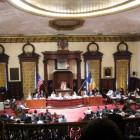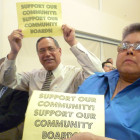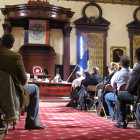Bronx
Drive For Nonpartisan Voting Confronts '03 Failure
Jarrett Murphy |
Those calling for an end to party primaries say that they exclude thousands of voters who do not belong to the Democratic party, whose nominees win most races in the city. Photo by: Jarrett Murphy
Those pushing the Charter Revision Commission to propose an end to party primaries say politics has changed since voters rejected a similar bid seven years ago. By: Jarrett Murphy
The city’s Charter Revision Commission on Wednesday night was nearing the end of three hours of expert testimony–most of it about whether nonpartisan elections would be good or bad for New York City’s democracy–when Commissioner Ernie Hart raised a practical question.If a proposal to have nonpartisan elections were put before the voters in 2010, how would the commission do to avoid a repeat of what happened in 2003, when voters rejected such a change by a 70-30 margin?That’s the kind of strategic quandary now facing the 15 mayor-appointed commissioners as they mull ways to improve voter participation in municipal elections, which has dropped almost without interruption since the 1960s. One measure–the percentage of New York’s presidential race voters who return for the mayoral race the following year–fell from 67 percent in 2001 to 45 percent in 2009.Wednesday’s testimony–only the second of five “issue forums” where the panel is hearing from policy experts on areas of the charter that might change–raised a host of thorny issues. How much of the turnout problem is due to the mechanics of voting versus the larger political culture?






